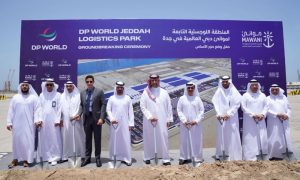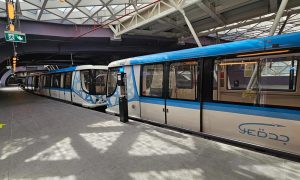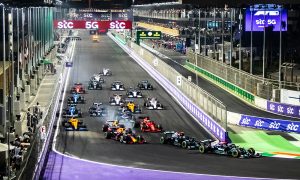The Rise of Jeddah
Opportunities in KSA’s second city

With a construction industry on track to be worth US $23.19 billion, by the end of 2011, growing at a rate of 4%, one
could almost forget Saudi Arabia became one of several countries to be struck by natural disaster earlier this year.
Jeddah has been hit by devastating floods for a number of years, yet this year’s did not only devastate the city’s residents, it shook the foundations of the commercial capital’s vision.
Formed in 2006, the Jeddah Development and Urban Regeneration Company (JDURC) adopted the ambitious remit of ensuring Jeddah transforms into a “world-class” city. Since the tragedy of more than 100 deaths and thousands of surviviors left homeless, much of the vision has been forced to turn practical with infrastructure brought to the forefront.
Instead of solutions to aging systems addressed in the Jeddah Strategic Plan, government efforts have now turned to devastation prevention, securing overdue projects and adding to projects already commissioned.
A public service contract with AECOM, leading suppliers of government and business technology, has recently been signed for a management services work order worth $ 171m.
The agreement includes consultancy, engineering, and construction of a citywide storm water, flood-control, and wastewater infrastructure improvement program in Jeddah.
John Dionisio president and chief executive officer for AECOM Technology Cooperation has particularly high hopes for how the developments will contribute to Jeddah.
“We are very excited to play the lead role in support of Jeddah’s infrastructure improvement plan. This flood control and wastewater program will enhance the quality of life for the city’s approximate 3.2 million residents,” he says.
Despite the sudden visionary changes, director of projects for Albalad Al Ameen development and urban regeneration company, Ziad Aazam confirms that traces of Jeddah’s previous plans still remain.
“Jeddah Strategic Plan draft, written in 2009, was meant to initiate various projects across the sectors in the city. The flood changed that intended vision,” says Ziad, who is the former director of planning and strategic studies at Jeddah Development and Urban Regeneration Co (JDURC).
“However, the city remains persistent in pursuing other sector developments of the city, such as Tahlia Street and water channel improvement projects,” he adds.
Among other projects that still appear to be going strong is the highly ambitious Qasr Khozam Regeneration. The concept is derived from the custodian of the two holy mosques King Abdul-Aziz Al Saud, and the plan is to
transform part of central Jeddah’s social, economic and construction standards, including links into the city’s networks.
Housing solutions
The severe shortage of homes has rendered housing projects of a particularly high priority in order to meet the rising needs of low and middle income residents.
Private and public development targets include building a total of 1.65 million homes over the next six years. Construction and home financing companies are emerging, in line with the Saudi Arabian government’s plan to increase home ownership by 80% within 13 years, by boosting the supply of affordable housing.
A recent Banque Saudi Fransi real estate survey for H2 2010, revealed the average price of a large apartment in Jeddah was $129,500 while small villas were $ 282,600. Under new rules the maximum bank loan is $133, 300, which although expected to help bridge the cost gap, will not solve all the current issues.
For example, the monthly salary requirement for a villa in Jeddah is $ 7,700, more than three times the average salary paid to residents, which currently stands at $2, 130.
This year, Cityscape Jeddah is hoping the majority of the real estate networking event’s visitors will be locals, capable of and willing to make a financial contribution to the sector.
“We hope that 60% of our visitors will be from Jeddah and that many are interested in buying properties and investing in the market,” says exhibition director Deep Marwaha.
Mortgage law approval
A recent development is the amendments approved by the kingdom’s formal advisory body, the Shura Council, to both Jeddah’s and Riyadh’s mortgage laws.
One feature of the approved draft allows banks to provide funds on real estate under the mortgage scheme, with a set of guidelines for the financing companies clearly spelling out procedures for repayment.
Marwaha believes this development is particularly significant for the younger generation looking to establish a life in the city. “I think the most important thing is the mortgage law. Unlike western countries there was no regulatory structure behind housing law before, although it has been talked about for quite a few years,” Marwaha says.
“There is a huge demand for housing, specifically affordable housing. Saudi Arabia has a very young population looking to buy houses after getting married. This law enables them to do that,” he adds.
King Abdullah has already responded to that demand, having approved the designs for 500,000 housing units which he had already ordered to be constructed across the country earlier this year, following the announcement
of a multi-billion dollar social welfare package.
His Highness also said he will personally follow the progress of the work, which will fall under the authority of the new housing ministry, upon completion.
Overpriced units
Al-Thaghar is the first housing scheme set to contribute to Jeddah’s affordable homes. The project began in 2010 and is expected to produce eight buildings with a total of 216 apartments.
Aazam is keen to see the Kingdom’s authorities focus on the completion of such initiatives, believing overpriced units to be the result of inflated land values.
“The solution has to come from the government to control land speculation and encourage real physical development of lands,” Aazam says, adding: “Comprehensive urban planning and building communities are some of many problems not being addressed clearly and with determination.”
“Studies have been conducted but rarely implemented and followed up,” he adds.
Since the mandate of the Jeddah Development and Urban Regeneration Company is to invest in the pre-design phase
before construction begins, Jeddah’s development progress has yet to be determined.
However, Aazam believes that officials are still in the beginning stages of the city’s upgrade.
“There is a lot of basic work that needs to be done before the city can claim to offer acceptable standards of living. This leaves urban development companies open to criticism.”
Direct multinational operations
Despite infrastructural problems, the Saudi Arabian Government’s recent decision to allow international companies to set up and manage their sales and distribution operations from the country promises to open up a new chapter of
the kingdom’s business market.
The decision attracted the management of confectionery giant Nestlé’s, a company keen to make its mark on Saudi Arabia’s 28 million inhabitants and sizeable youth population, with plans to establish its headquarters in Jeddah.
The move makes them one of the first FMCG multinationals to have a direct operational presence in the Kingdom.
Along with additional office branches in Riyadh and Khobar the brand will create 225 jobs in Saudi Arabia. Although in the first year of operations management is already at 30% of the local Saudisation targets, which they are determined to exceed.
We see the commencement of direct sales and distribution operations as the beginning of a new and exciting chapter in Nestlé’s long operational history in Saudi Arabia,” says Yves Manghardt, chairman and CEO of Nestlé Middle East FZE.
Saudi’s young talent
In addition to expanding the business network the international food and nutrition company is organising initiatives which will boost KSA’s education providing training for external Saudi national graduates through Nestlé’s expertise.
“Nestlé’s commitment to young Saudi talents goes beyond meeting the Saudisation targets as we are looking to partner with key universities and institutions in the Kingdom through the establishment of the Nestlé Centre Of Excellence,” says Roger Meguerdichian, country manager for Nestlé Saudi Arabia.
“The centre is a sales training academy, which will also focus on a Nestlé female Nutrition Development Program and our Graduate Development Program for young Saudi graduates,” he adds.
Although JDURC is unable to fully establish the progress that Jeddah has made to become a world-class city, the wide range of projects it is overseeing across the city and its surrounding regions reveals that Jeddah’s officials have the
motivation, vision and capital investment to deal with the city’s issues.
These fact, coupled with the clear project aims, which focus on Jeddah’s urgent need for urban regeneration, the redevelopment of unplanned settlements and even developing whole communities Jeddah, means it is still a city to watch.




